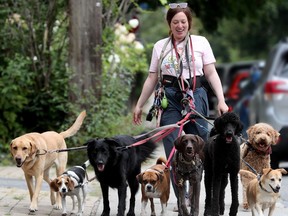
Article content
Dogs and cats may very well be man’s best friends, but they don’t share our love for staring at the sun.
While pet owners are naturally concerned about how Max or Daisy will react to Monday’s solar eclipse, there’s no need to panic about potential long-term impacts.
Article content
“Humans are fascinated by (the eclipse), but dogs aren’t,” said Stephen Smith, Ottawa Humane Society’s senior manager of marketing and communications.
Advertisement 2
Story continues below
Article content
The warnings about humans staring into the skies Monday without proper eye protection are everywhere, but there’s no need to seek out special canine or feline glasses out of fear animals will damage their eyes. They won’t be looking skyward.
Dogs and cats may, however, temporarily wonder what is going on with the mid-day darkness, similar to how some pets react to thunderstorms.
“They might have a bit of anxiety and we encourage people to be there and provide comfort and look for signs of stress,” Smith said. “Some might cower a bit and briefly look for shelter.”
If there’s any uncertainty about whether to walk the dog during the eclipse, Smith suggests caution is the best option.
Should the eclipse watching plans include bringing a canine to a viewing party, Smith says it’s important “to make sure the animal is comfortable with crowds.”
Bird and insect actions, however, are expected to be markedly different.
Anecdotal evidence from previous solar eclipses has revealed that many birds, insects and other outdoor creatures alter their behaviour when the moon passes in front of the sun.
Advertisement 3
Story continues below
Article content
While humans are being told (repeatedly) what to expect from the skies, confusion reigns in the animal kingdom when everything turns dark and atmospheric pressures change.
During the August 2017 eclipse across parts of the United States, there were reports of odd animal reactions: owls hooted; pigeons returned to roost; other birds stopped singing; bees ended their buzzing; nighthawks took flight in mid-afternoon; spiders tore down their webs; grey squirrels retreated to their dens; and crickets went eerily silent.
Both professional and hobbyist zoologists and wildlife biologists will be on the lookout for similar oddities on Monday.
“They are way more sensitive than we are to those subtle variations,” Dr. Sarah Guenette, a veterinarian at the Sainte-Anne-De-Bellevue Ecomuseum, told the Montreal Gazette. “When there’s going to be, for instance, an earthquake, the animals know it very, very early. They will go hide. You’ll see the birds stop singing.”
Indeed, exhaustive studies of the 2017 eclipse by the Cornell Lab of Ornithology and the U.S. National Weather Service showed decreased movement of birds and insects during the height of the event.
Advertisement 4
Story continues below
Article content
“The daytime activity is declining,” Andrew Farnsworth, a migration researcher at Cornell, said in a March article in Audubon Magazine.
“But it’s not a powerful enough stimulus to create what happens typically at sunset, in terms of the emergence of lots of nocturnal insects or the exodus of birds migrating at night.”
Monday’s situation could be different from 2017 because the eclipse is happening in the spring — during peak migration season — and because of the four-minute time span of totality in some areas. That will be double the time frame of the 2017 eclipse.
Birds, according to Farnsworth, could be more motivated to take off when the afternoon darkness arrives.
Recommended from Editorial
Article content


Comments